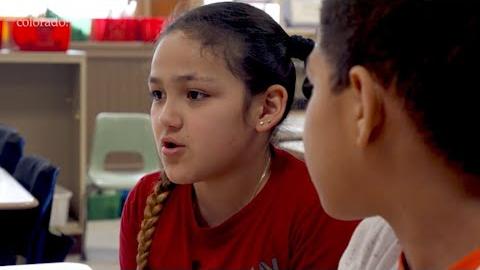Accountable Talk

Accountable talk is a strategy that supports students' academic language development through discussion by giving students key phrases they can use when learning skills such as explaining, agreeing, disagreeing, and justifying. This strategy is part of Colorín Colorado's ELL Strategy Library and can be used to support academic language development for all students.
Professional Learning Resources
See hands-on professional learning materials below, including a slide deck with videos and activities.
Strategy Overview
How This Strategy Supports Language Development
Accountable talk is a tool that students can use to expand and further develop their use of academic language in classroom discussions by learning explicit structures and key phrases with ample opportunity to practice using them across content areas.
Research connection
In her 2018 American Educator article, "Educating English Learners: A Review of the Latest Research," Dr. Diane August writes, "One of the key principles of instruction in a second language is enabling students to interact via speaking, listening, reading, and writing with peers in their second language. Speaking is important to generate feedback, encourage syntactic processing, and challenge students to engage at higher proficiency levels." (See original article for references and citations.)
Note: Accountable talk can occur in students' languages and include the instruction of key phrases in students' languages. It can also include opportunities for students to discuss their ideas in their language before sharing more broadly with the class. See more in the blog post Transforming learning with translanguaging from Tan Huynh.
Step-by-Step Instructions
Planning
- Identify the key discussion skill you wish to teach (agree, disagree, justify, build on, clarify, citing evidence, etc.).
- Identify the key phrases students will need to use as they practice that skill.
- Create sentence frames using the key phrases.
- Post the phrases and keep them visible so that students can refer back to them.
- Provide students with their own copy of the phrases for reference.
- If possible, translate the key phrases into students' languages and give them practice using the phrases with peers.
Instruction
- Introduce the key skill you are going to teach. Ask students for their ideas on how this skill can be useful in the classroom and in daily life.
- Model how to use the phrases you selected for that skill with concrete examples.
- Put students in pairs in order to practice with more concrete examples.
- Next, show students how to use the phrases in discussions related to classroom content.
- Give them additional practice with the phrases.
- In future lessons, remind or prompt them to use their key phrases whenever appropriate.
Lessons Learned
- Teach one key phrase at a time.
- Give students ample time to practice.
- Recognize and celebrate students' use of the key phrases, as Mr. Ortiz does in the video below.
Differentiation
- Provide additional visual support and scaffolds as needed.
Co-Teaching Considerations
Content or Grade-Level Teacher
- Identify key skills and activities in which students will be using those skills across different content areas.
English Language Development Teacher
- Identify key phrases and structures that students will need to practice those skills.
- Share ideas on how to give students additional practice with key phrases through discussion.
Examples
| Skill | Phrases |
|---|---|
| Agreeing with a speaker | Entering/Emerging: I agree with ________. Developing: I agree with _________ because.... Expanding: I agree with her point that ________ because.... |
| Adding onto another speaker's point | Entering/Emerging: In addition, ______. Developing: I want to add that ________. Expanding: I agree with her point that ________ and want to add.... |
| Citing evidence | Entering/Emerging: The text says ________. Developing/Expanding: I think that _______ because the text says _______. |
Professional Learning Session: Accountable Talk
This Colorín Colorado slide show walks through the Annotated Diagrams strategy and can be used for turnkey professional development sessions. Please share attribution to Colorín Colorado.
To get started, you need:
- Accountable Talk Slide Deck: Includes activities, discussion questions, and speaker's notes (also featured below)
- Accountable Talk Presenter's Guide: Includes tips for planning your session and handouts
To edit this presentation, you can download or copy the slides:
- File > Download (no Google account required)
- File > Make a copy (Google account required)
Resources
Sentence stems & frames for discussion
- Accountable Talk Frames to Support Language Functions
- Discussion sentence starters (Arlington Public Schools)
- Accountable Talk: Discussion Starters (Mississippi Department of Education)
- Teacher Toolkit for Increasing Student Engagement and Accountable Talk (MTSS for ELLs)
Related strategy: QSSSA
- QSSSA: More than Turn & Talk (Seidlitz)
- QSSSA: The Secret Ingredient to Language-Rich, Interactive Classrooms (Seidlitz)
- Teaching MLs Podcast: The QSSSA Strategy Explained
Learn more
- Helping Young Multilingual Learners Develop Their Metacognitive Skills (Edutopia)
- Socratic Circles and the Common Core: An Introduction (Parts I, II, and III) (Colorín Colorado)
- Navigating Tough Topics: Developing Students’ Discussion Skills (Colorín Colorado)
- Video and Tips: Accountable Discussions (Teacher Toolkit)
- Academic Language Function Toolkit
- Using Language Pathways to Foster Language Awareness and Educational Equity by Dr. Cynthia Lundgren and Dr. Stephanie D'Costa
- Teaching with the WIDA 2020 ELD Standards in a Second-Grade Literacy Block by Dr. Ruslana Westerlund
Acknowledgements
Special thanks to the authors of these strategies, Beth Skelton and Tan Huynh. For additional ideas and resources from the authors, see their book, Long-Term Success for Experienced Multilinguals.






